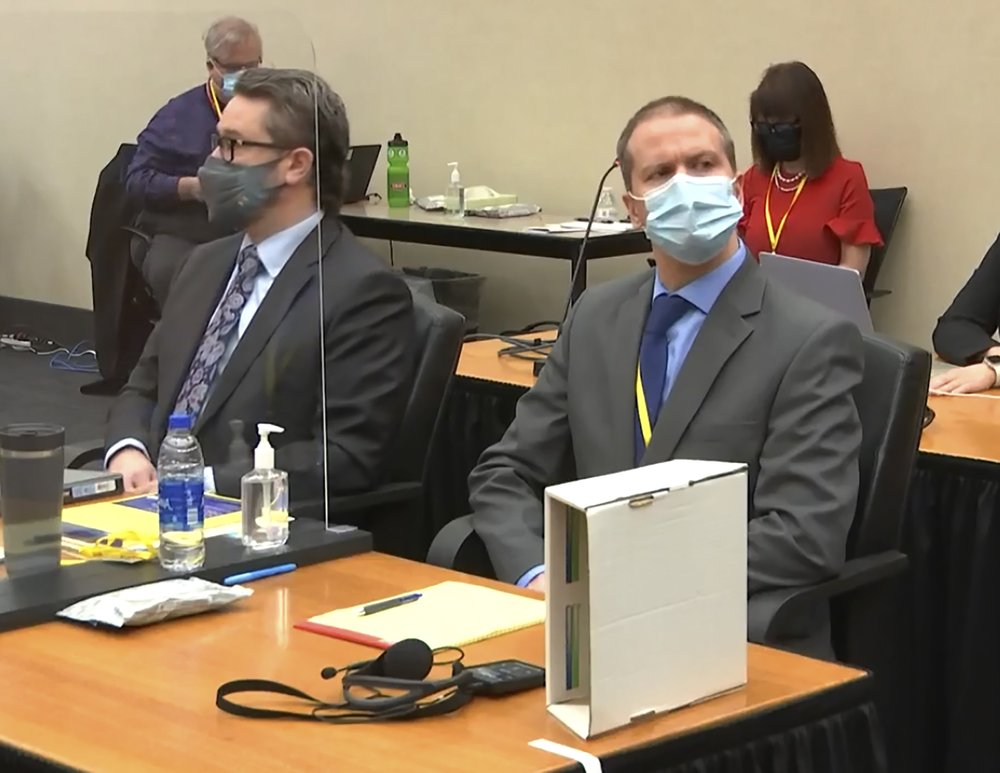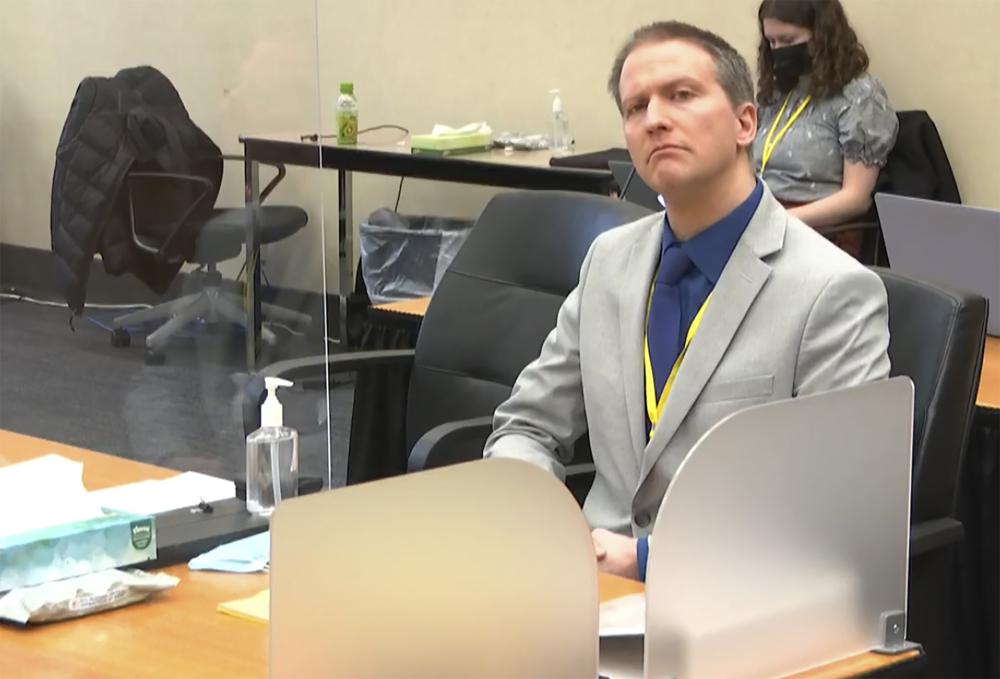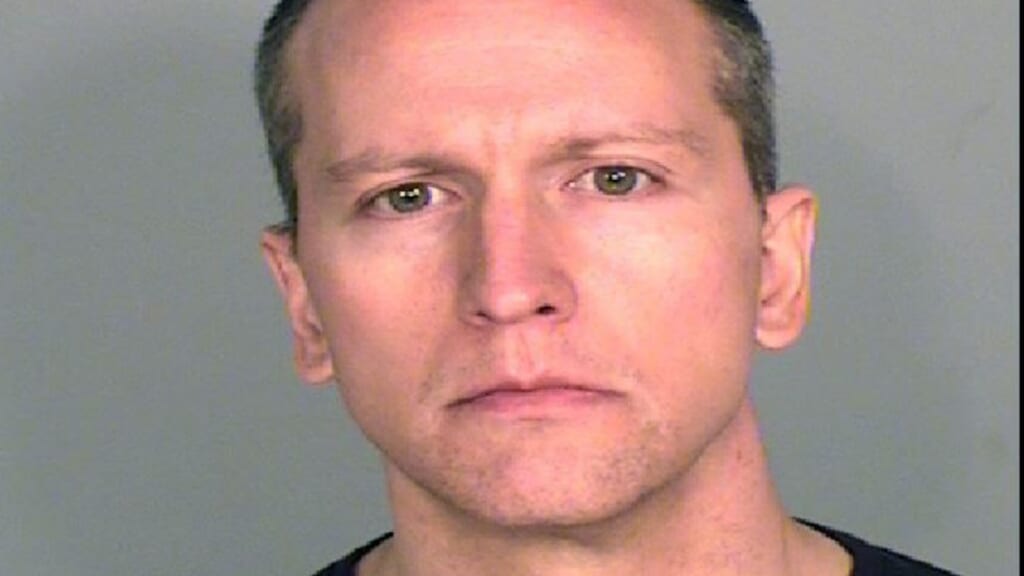DOJ considers charging Chauvin for alleged 2017 assault of Black teen
Chauvin then “applied a neck restraint, causing the child to lose consciousness and go to the ground," according to court documents

Stephanie Guerilus
Derek Chauvin was found guilty in the murder of George Floyd and his legal troubles may not yet be over. The DOJ may go after him on federal charges in Floyd’s murder and allegedly kneeling on a Black teen’s neck, according to ABC News.
A jury convicted Chauvin on Tuesday of second-degree murder, third-degree murder, and second-degree manslaughter in Floyd’s death after kneeling on his neck for more than nine minutes. This was not the first instance of Chauvin using his knee to obstruct the breathing of another person. Defense attorney Eric Nelson, left, and former Minneapolis police officer Derek Chauvin listen as Hennepin County Judge Peter Cahill presides over pre-trial motions prior to opening statements, Monday March 29, 2021, in the trial of Chauvin, in the May 25, 2020, death of George Floyd at the Hennepin County Courthouse in Minneapolis, Minn. (Court TV via AP, Pool)
Defense attorney Eric Nelson, left, and former Minneapolis police officer Derek Chauvin listen as Hennepin County Judge Peter Cahill presides over pre-trial motions prior to opening statements, Monday March 29, 2021, in the trial of Chauvin, in the May 25, 2020, death of George Floyd at the Hennepin County Courthouse in Minneapolis, Minn. (Court TV via AP, Pool)
Read More: 3 other officers still awaiting trial after Chauvin guilty verdict
On Sept. 4, 2017, the former Minneapolis police officer was caught on video hitting a Black teenager with a flashlight, causing him to bleed, requiring stitches. Chauvin then “applied a neck restraint, causing the child to lose consciousness and go to the ground,” according to court documents, ABC News reported.
Chauvin allegedly held the teenager down with his knee for 17 minutes despite the boy insisting he couldn’t breathe.
“Those videos show a far more violent and forceful treatment of this child than Chauvin describes in his report,” Matthew Frank, one of the state prosecutors, wrote in a court filing at the time.
Frank further added that the videos showed that Chauvin’s use of unreasonable force towards this child and “complete disdain for his well-being.”
Derek Chauvin was found guilty in the murder of George Floyd and his legal troubles may not yet be over. The DOJ may go after him on federal charges in Floyd’s murder and allegedly kneeling on a Black teen’s neck, according to ABC News.
A jury convicted Chauvin on Tuesday of second-degree murder, third-degree murder, and second-degree manslaughter in Floyd’s death after kneeling on his neck for more than nine minutes. This was not the first instance of Chauvin using his knee to obstruct the breathing of another person.
 Defense attorney Eric Nelson, left, and former Minneapolis police officer Derek Chauvin listen as Hennepin County Judge Peter Cahill presides over pre-trial motions prior to opening statements, Monday March 29, 2021, in the trial of Chauvin, in the May 25, 2020, death of George Floyd at the Hennepin County Courthouse in Minneapolis, Minn. (Court TV via AP, Pool)
Defense attorney Eric Nelson, left, and former Minneapolis police officer Derek Chauvin listen as Hennepin County Judge Peter Cahill presides over pre-trial motions prior to opening statements, Monday March 29, 2021, in the trial of Chauvin, in the May 25, 2020, death of George Floyd at the Hennepin County Courthouse in Minneapolis, Minn. (Court TV via AP, Pool)Read More: 3 other officers still awaiting trial after Chauvin guilty verdict
On Sept. 4, 2017, the former Minneapolis police officer was caught on video hitting a Black teenager with a flashlight, causing him to bleed, requiring stitches. Chauvin then “applied a neck restraint, causing the child to lose consciousness and go to the ground,” according to court documents, ABC News reported.
Chauvin allegedly held the teenager down with his knee for 17 minutes despite the boy insisting he couldn’t breathe.
“Those videos show a far more violent and forceful treatment of this child than Chauvin describes in his report,” Matthew Frank, one of the state prosecutors, wrote in a court filing at the time.
Frank further added that the videos showed that Chauvin’s use of unreasonable force towards this child and “complete disdain for his well-being.”

In this image from video, former Minneapolis police Officer Derek Chauvin listens as his defense attorney Eric Nelson gives closing arguments. (Credit: AP)
Frank added that Chauvin and the other officer present ignored the pleas of the 14-year-old’s mother.
“Chauvin and [the other officer] placed [the teenager] in the prone position and handcuffed him behind his back while the teenager’s mother pleaded with them not to kill her son and told her son to stop resisting,” Frank wrote. “About a minute after going to the ground, the child began repeatedly telling the officers that he could not breathe, and his mother told Chauvin to take his knee off her son.”
Read More: Derek Chauvin found guilty on all charges in the murder of George Floyd
Chauvin released his hold on the teenager and said he was under arrest for domestic assault and obstruction with force.
Judge Peter A. Cahill did not allow this incident into evidence during Chauvin’s trial as a pattern of behavior for the former cop. However, sources told ABC News that the Department of Justice may pursue federal charges into the matter and Floyd’s death.
Frank added that Chauvin and the other officer present ignored the pleas of the 14-year-old’s mother.
“Chauvin and [the other officer] placed [the teenager] in the prone position and handcuffed him behind his back while the teenager’s mother pleaded with them not to kill her son and told her son to stop resisting,” Frank wrote. “About a minute after going to the ground, the child began repeatedly telling the officers that he could not breathe, and his mother told Chauvin to take his knee off her son.”
Read More: Derek Chauvin found guilty on all charges in the murder of George Floyd
Chauvin released his hold on the teenager and said he was under arrest for domestic assault and obstruction with force.
Judge Peter A. Cahill did not allow this incident into evidence during Chauvin’s trial as a pattern of behavior for the former cop. However, sources told ABC News that the Department of Justice may pursue federal charges into the matter and Floyd’s death.

Former Minneapolis police officer Derek Chauvin poses for a mugshot after being charged in the death of George Floyd. (Photo by Ramsey County Sheriff’s Office via Getty Images)
The Minneapolis Police Department was informed of the DOJ’s inquirers and a spokesperson pledged to be of assistance.
“We will assist the DOJ with anything that they need, and the chief has pledged full cooperation with any investigating agency,” MPD spokesman John Elder told ABC News.
A spokesperson for the DOJ declined to comment to ABC News, but they have signaled their intentions in recent days. Attorney General Merrick Garland announced on Wednesday that the DOJ would be launching a civil investigation into the conduct of the MPD. The prole would determine if the department “engages in a pattern or practice of unconstitutional or unlawful policing.”
Garland added that law enforcement should not be wary of accountability.
“Good officers welcome accountability because accountability is an essential part of building trust with the community, and public safety requires public trust,” Garland said.
The Minneapolis Police Department was informed of the DOJ’s inquirers and a spokesperson pledged to be of assistance.
“We will assist the DOJ with anything that they need, and the chief has pledged full cooperation with any investigating agency,” MPD spokesman John Elder told ABC News.
A spokesperson for the DOJ declined to comment to ABC News, but they have signaled their intentions in recent days. Attorney General Merrick Garland announced on Wednesday that the DOJ would be launching a civil investigation into the conduct of the MPD. The prole would determine if the department “engages in a pattern or practice of unconstitutional or unlawful policing.”
Garland added that law enforcement should not be wary of accountability.
“Good officers welcome accountability because accountability is an essential part of building trust with the community, and public safety requires public trust,” Garland said.
No comments:
Post a Comment